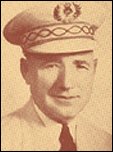Tony Goetz: Music Impresario

WHEN I CAME to Muskogee in 1940, I was told that one of the most important and influential person in the city was Tony Goetz, musician impresario. I thought about writing on this man for some time, but little did I realize the background of this individual and the extent of influence until I chatted with some of his former pupils.
Anton Goetz was born on March 21, 1884 at Iron Gate on the Danube River in Hungary. At the age of five, he entered the prestigious Beethoven Conservatory at Budapest. When he graduated at age 15, he was declared an accomplished musician and could play any musical instrument presented to him. When he was 19, he directed the band of the King of Sweden.
At that time it was mandatory that the eldest son serve in the Austrian army. Tony's father was able to obtain permission for his eldest son to stay at home to support the family, provided his second son, Tony, would serve in his place. So Tony was inducted into the Austrian army.
Tony's musical ability soon came to light, and he was placed in charge of the Austrian Army band. The officers soon became jealous of the upstart and set about to destroy him. He received word that he was to be court-martialed with charges to be brought against him for spying, a trumped up charge. He escaped into France, associating himself with the Buffalo Bill Wild West Show. His father was subsequently tragically killed because of Tony's desertion.
Tony eventually came to the United States with a vaudeville group. He often said he literally kissed the ground when he landed on American soil. He was known to preach Americanism throughout his later life.
During the vaudeville tour, he was hospitalized in Oregon with a broken leg. While in the hospital he was visited by a woman who soon became his wife.
When word was passed around of his military and musical background, he was encouraged to join the United States Army. It was not long before he was director of the First Division Band.
Tony saw service in the excursion into Mexico in pursuit of Pancho Villa and in World War I. During the latter, he directed the United States Army Band, continuing until 1920.
Gus Shufflebein, the manager of the Torson Hotel and an active Shriner, met Tony on a Shrine trip sometime early in 1920. He was so impressed with him that he urged Tony to come to Muskogee.
Tony subsequently came to Muskogee and organized the Shrine Band and since the public schools had no band, he was asked to organized one. So successful was this endeavor that he was voted Muskogee's outstanding citizen in 1927.
He organized the Muskogee Symphony orchestra in 1929 and was pictured in 1935 when he directed the orchestra for the seventh season. Tony also organized a community chorus which he directed for several years. He even directed the band for the School for the Blind for a period.
The Shrine Band was featured at numerous national conventions and Central High School Band, known as the “Pride of Muskogee,” was in demand far and wide. They held weekly concerts in Spaulding Park in the summer and played a Christmas concert in front of the Broadway Theater every year.
Another custom was to gather at Spaulding Park and march to Greenhill Cemetery in Muskogee on Memorial Day, where they played a concert honoring deceased veterans, to show Tony's sincere appreciation for being an American.
James D. Gibson, who was a member of the Shrine Band, the Symphony Orchestra and the Community Chorus later said that Tony was a superb psychologist. He said though he was a strict disciplinarian when dealing with young people, he was very liberal with the adults in the Shrine Band — in both obtaining superior efforts from the musicians. He said that Tony could take the most difficult musical selections and rewrite them to make amateurs produce outstanding music.
Charles Procter, who was in Tony's Central High Band from the age of 8 and a member of the Shrine Band, says Tony had a magnetic personality, an air of greatness, and was a natural leader. He says his discipline was coupled with an unusual sense of humor. Proctor says that Tony would go to bat for you if you were right, but if you were wrong, he was just as quick to see you received your punishment and that he intervened many times between “his boys” and the principal. Procter also remembered that band practice, though demanding, was never boring, and that he could “cause you to play above your ability.”
Tony died March 3, 1948. His funeral was held in the Masonic Temple. His last request was that Charles Procter conduct the Central High School Band at his funeral. Mrs. Procter altered Tony's band uniform to fit Charles for the occasion. Tony was laid to rest in Fort Gibson National Cemetery.
Muskogee lost one of its most patriotic and devoted citizens, one who influenced it youth more than will ever be known. Later the City of Muskogee honored Goetz by naming one of its elementary schools in his honor.
by C. W. "Dub" West
Anton Goetz was born on March 21, 1884 at Iron Gate on the Danube River in Hungary. At the age of five, he entered the prestigious Beethoven Conservatory at Budapest. When he graduated at age 15, he was declared an accomplished musician and could play any musical instrument presented to him. When he was 19, he directed the band of the King of Sweden.
At that time it was mandatory that the eldest son serve in the Austrian army. Tony's father was able to obtain permission for his eldest son to stay at home to support the family, provided his second son, Tony, would serve in his place. So Tony was inducted into the Austrian army.
Tony's musical ability soon came to light, and he was placed in charge of the Austrian Army band. The officers soon became jealous of the upstart and set about to destroy him. He received word that he was to be court-martialed with charges to be brought against him for spying, a trumped up charge. He escaped into France, associating himself with the Buffalo Bill Wild West Show. His father was subsequently tragically killed because of Tony's desertion.
Tony eventually came to the United States with a vaudeville group. He often said he literally kissed the ground when he landed on American soil. He was known to preach Americanism throughout his later life.
During the vaudeville tour, he was hospitalized in Oregon with a broken leg. While in the hospital he was visited by a woman who soon became his wife.
When word was passed around of his military and musical background, he was encouraged to join the United States Army. It was not long before he was director of the First Division Band.
Tony saw service in the excursion into Mexico in pursuit of Pancho Villa and in World War I. During the latter, he directed the United States Army Band, continuing until 1920.
Gus Shufflebein, the manager of the Torson Hotel and an active Shriner, met Tony on a Shrine trip sometime early in 1920. He was so impressed with him that he urged Tony to come to Muskogee.
Tony subsequently came to Muskogee and organized the Shrine Band and since the public schools had no band, he was asked to organized one. So successful was this endeavor that he was voted Muskogee's outstanding citizen in 1927.
He organized the Muskogee Symphony orchestra in 1929 and was pictured in 1935 when he directed the orchestra for the seventh season. Tony also organized a community chorus which he directed for several years. He even directed the band for the School for the Blind for a period.
The Shrine Band was featured at numerous national conventions and Central High School Band, known as the “Pride of Muskogee,” was in demand far and wide. They held weekly concerts in Spaulding Park in the summer and played a Christmas concert in front of the Broadway Theater every year.
Another custom was to gather at Spaulding Park and march to Greenhill Cemetery in Muskogee on Memorial Day, where they played a concert honoring deceased veterans, to show Tony's sincere appreciation for being an American.
James D. Gibson, who was a member of the Shrine Band, the Symphony Orchestra and the Community Chorus later said that Tony was a superb psychologist. He said though he was a strict disciplinarian when dealing with young people, he was very liberal with the adults in the Shrine Band — in both obtaining superior efforts from the musicians. He said that Tony could take the most difficult musical selections and rewrite them to make amateurs produce outstanding music.
Charles Procter, who was in Tony's Central High Band from the age of 8 and a member of the Shrine Band, says Tony had a magnetic personality, an air of greatness, and was a natural leader. He says his discipline was coupled with an unusual sense of humor. Proctor says that Tony would go to bat for you if you were right, but if you were wrong, he was just as quick to see you received your punishment and that he intervened many times between “his boys” and the principal. Procter also remembered that band practice, though demanding, was never boring, and that he could “cause you to play above your ability.”
Tony died March 3, 1948. His funeral was held in the Masonic Temple. His last request was that Charles Procter conduct the Central High School Band at his funeral. Mrs. Procter altered Tony's band uniform to fit Charles for the occasion. Tony was laid to rest in Fort Gibson National Cemetery.
Muskogee lost one of its most patriotic and devoted citizens, one who influenced it youth more than will ever be known. Later the City of Muskogee honored Goetz by naming one of its elementary schools in his honor.
by C. W. "Dub" West
Muskogee's Regional Heritage CenterWith Assistance from the City of Muskogee
(c) 2024 Three Rivers Museum
|
FInd-Contact-connectMuseum Hours Facebook
Wednesday-Saturday 10 a.m.-5 p.m. Newsletter/Mailing List Contact Info 220 Elgin Muskogee, OK 74401 918-686-6624 [email protected] |
